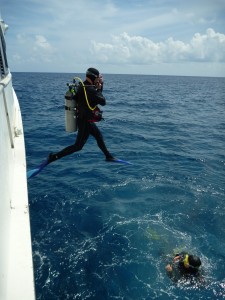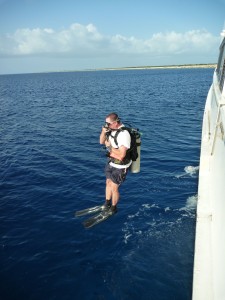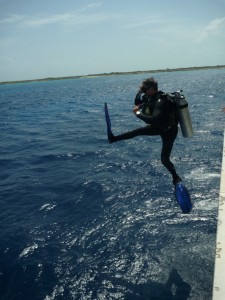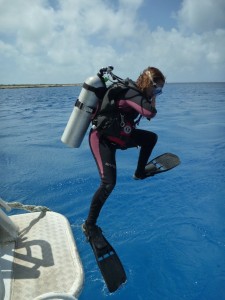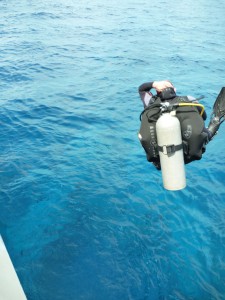As many of you know I was working on the Explorer Ventures scuba dive liveaboard in the Turks and Caicos Islands in 2014-2015 and if you haven’t already done so (or know so), scuba liveaboards are the way to go in the world of scuba diving! The Turks and Caicos Explorer II is a 125ft vessel that hosts a maximum of 20 scuba divers on 1 week trips where they eat, sleep, and scuba dive 5 times a day. My job as both Dive Instructor and Purser on the ship was to assist divers in and out of the water 5 times a day (among a zillion other things!).
I did the math the other day and determined that on average, I assisted with and witnessed 540 boat dive entries a week (27 dives/week x 20 divers). I also worked blocks of 12 weeks in a row, which equals 6 480 scuba dive entries every 3 month period! On that note, I would like to declare myself an expert in the field of scuba dive entries!
You may think that entering the water from a boat as a scuba diver is pretty straight forward; however, I would like to admit that I have seen some pretty interesting and non-traditional entries on a regular basis. In this blog I’ve decided to outline the most common types of entries as well as the ones that make me laugh on a daily basis. Have I mentioned I love my job?
Perhaps a mini-briefing on scuba dive entries before I dive right in to the good stuff, which will be a great refresher for those who haven’t been in the water for awhile. Depending on the type of boat you are using there are a variety of methods to get into the water and enjoy your dive. Always inquire from your divemaster and/or captain as to the method that is used for each vessel. During the PADI Open Water course you learn two types and possibly others depending on the region or conditions you are learning in. One is called the Controlled Seated Entry, where you are sitting geared up on the edge of a platform (like a dock or edge of a boat) with your fins on your feet as they dangle in the water. Then you twist your body to one side and place both hands on the edge next to you. After that you simply need to continue to turn your body as you push away from the platform. Although we teach this method and, in my opinion, it seems like a safe and easy method of entry, I can’t say I’ve really seen anyone use it outside of the training. Not sure why…
The other method of entry we teach in the course and is the most common scuba dive entry I’ve seen, is called the Giant Stride Entry. With all of your gear on, including fins, mask and regulator in your mouth, you take the palm of your hand (usually the right hand) and put it on your regulator while your fingers are on your mask. This helps hold them in place when you hit the water. Your other hand can do one of three things depending on you and your situation. Originally you were told to hold the buckle of your weight belt, to avoid it from opening upon impact with the water. But these days, most people are using integrated weights, so it isn’t necessary. Instead, what many of those divers do is gather their console and alternate and hold those with their other hand. This avoids the potential for a dangling hose to be caught on something on the boat while you are dropping into the water. The third option is what I recommend as I see masks slipping off all the time. You should take your other hand and hold the back of your mask strap so it doesn’t slip off and you lose your mask once you hit the water.
Okay, so we’ve got one hand holding your regulator and mask in place and the other holding the back of your mask strap (or your weight belt, or your gauge), now you need to look straight out towards the horizon (try not to look down once you have checked that the area is clear). When you are ready, you just need to take a step and you will have completed the Giant Stride Entry! We tend to move in the direction we are looking, so by looking out at the horizon, you will step far enough away from the boat not to hit the back of your tank on the boat. Don’t forget to signal to the boat that you are okay by putting your fist on your head or giving the okay sign with your hand.
This is a fantastic example of a Giant Stride Entry off of the Turks and Caicos Explorer II in 2014.
Okay, so now you know the standard, but what I really wanted to talk about here today are the out of the ordinary, extraordinary, where-did-they-come-up-with-that-technique, styles that I have put into 4 categories. I’m not sure where these have evolved from, but I think they are ultimately the result of each scuba diver’s unique individual style…or lack of coordination! Either way, they have provided me with an endless amount of amusement throughout my days on the boat! For each scuba dive entry, I will rate it with a Splash Factor between 1 (not much splash) and 5 (big splash!).
The Torpedo
The first scuba dive entry I’d like to talk about is my favourite. According to The Torpedo-ites, this style seems to have come about due to scuba diving in locations that have a significant drop between the platform and the water and/or a negative entry was required. To perform this entry, the scuba diver approaches his exit point, steps off the platform and brings both feet together in one smooth action resulting in a streamlined entry like a torpedo plummeting straight into the water. This tends to be a very clean and tidy entry with no flailing arms and dangling gear. The Splash Factor is a 2!
Guitar Hero
This type of scuba dive entry is super fun. I’ve only ever seen men do it and it is reminiscent of those guys in your life who totally wish they were rock stars. You know the types – they are the ones who are playing the air guitar like there’s no tomorrow. Technically speaking, they are performing The Giant Stride Entry just as it says to do in the text book, but these guys have simply added some style. They lift their leg just a little bit higher and reach for the stars as they leap from the vessel probably with some rockin’ AC/DC or Dire Straits internal playlist happening in their heads. I’ll never forget the first one I ever saw by Mike Swisher and then more recently from Tim Tetlow! Rock On Scuba Divers!!! The Splash Factor is a 3!
Froggy
This is one of those scuba dive entries that is so strange and unusual that the first time I ever saw it, I thought it was one of those once in a lifetime happenings. I remember genuinely enjoying the show and shaking my head in wonder at all the funtastic things I get to see in my job. But low and behold, The Froggy seems to be some strange, but common scuba dive entry. Let me try to explain how one goes about doing this entry. The diver will prepare himself as usual; approach the platform wearing fins, mask, regulator in mouth; and when they are ready and it is clear they will bend at the knee and spring up and outward bringing both legs up towards their chest as they jump out. I feel fortunate that I was able to snap this fab photo because this is definitely the type of scuba dive entry that you need to see to believe it. The Splash Factor is a 5!
Free-Style
The Free-Style category is an anything goes division in the rating of scuba dive entries. Some divers tend to be performers. They like the attention and want to try things a little out of the ordinary and always with a touch of shock value added to the list. I remember watching anxiously as this young girl did a flip in the air from the edge of the boat to the water wearing all of her dive gear. I do not recommend that at all as it looked just like an accident waiting to happen! I also remember this fantastic little bearded Russian man who would gently fall into the water like a tree that had just been cut down. He’d rotate slightly in a log roll so he’d hit the water just right. I wanted to yell “TIMBER!” every time he went for his dives. We also had the pleasure of hosting Dave Smith and his dive shop, Blue Horizons Dive Center in Pennsylvania. Dave is a performer too! I was able to capture him doing an awesome cannon ball as his entry into the deep blue sea. The Splash Factor is almost always a 5 for a Freestyler!
So, what have we learned here? There are a number of takes on the traditional Giant Stride Entry. As long as you are safe, the added style to each entry will generate giggles from your divemasters and dive buddies. My personal favourite is to jump in and put my fins on while I’m underwater already. I love the gentle free fall on my toes! Please don’t hesitate to contact me if you have any questions about these or any other scuba dive entries! Happy Hopping!
